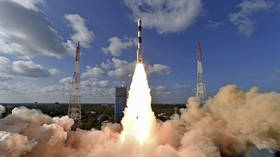Indian startup successfully sends rocket with 3D-printed engine to space

Indian space startup Agnikul Cosmos on Thursday carried out a sub-orbital test-flight of its home-built 3D-printed semi-cryogenic rocket – Agnibaan – after four unsuccessful attempts.
The test was conducted from its launch pad at Sriharikota, making Agnikul Cosmos the second private company in India to achieve this. Skyroot Aerospace launched its Vikram S suborbital rocket in November 2022.
After Agnikul’s successful liftoff on Thursday, the Indian Space Research Organization (ISRO) congratulated the team of engineers, calling the launch a “major milestone.” The mission – Agnibaan SOrTeD (Suborbital Tech Demonstrator) – was aborted earlier this week just seconds before liftoff due to technical issues. Previous attempts were made in March and April this year.
Thursday’s test showcased the country’s first semi-cryogenic engine, which uses a mix of liquid and gas for propellant, and utilized the first single-piece 3D-printed engine designed and built domestically. The test is seen as a predecessor to the launch of Agnibaan, a launch vehicle capable of carrying a 300kg payload 700km into orbit, according to the Times of India.
India's Prime Minister Narendra Modi congratulated the startup team, calling the achievement “a remarkable feat which will make the entire nation proud!”
A remarkable feat which will make the entire nation proud! The successful launch of Agnibaan rocket powered by world’s first single-piece 3D printed semi-cryogenic engine is a momentous occasion for India’s space sector and a testament to the remarkable ingenuity of our Yuva… https://t.co/iJFyy0dRqqpic.twitter.com/LlUAErHkO9
— Narendra Modi (@narendramodi) May 30, 2024
The company, which was founded in 2017 by two aerospace engineers, aims to offer launch-on-demand services.
“This is a huge boost and a proud moment for India’s thriving private space industry and just a glimpse into what the future holds for us,” AK Bhatt, the director-general of the Indian Space Association, said.
Thursday’s liftoff was also India’s first launch from a private launchpad. The startup has received approval to build a launchpad near the coastline of Sriharikota island – India’s primary site for the launching of rockets and multi-stage satellite launch vehicles. Agnikul’s launchpad, which features a dedicated control room, was inaugurated in 2022 by ISRO chairman S. Somnath.
In 2020, New Delhi set up the Indian National Space Promotion and Authorization Center to facilitate the participation of private companies in the space sector. The move was seen as a major boost to the space startup scene, which has grown rapidly since. At present, India has around 200 private space companies.
As RT reported earlier this month, India is building a second spaceport at Kulasai on the country’s east coast – around 770km south of Sriharikota – ‘India’s Cape Canaveral’ – where the ISRO’s Sriharikota Range (officially known as Satish Dhawan Space Center is located.
Earlier this year, the federal government said it would allow 100% foreign direct investment (FDI) in the space sector to further liberalize it and attract more private players. Earlier, FDI was permitted only by government approval to establish and operate satellites.
Last year, India launched its first successful mission to the Moon, Chandrayaan-3. At present, the ISRO is working on the Gaganyaan mission, which will send Indians to space. The country plans to build its own space station by 2035 and send the first Indian to the Moon by 2040.
Where India Meets Russia: Follow and share RT India on X and Instagram













